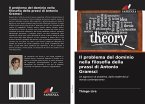Walter Benjamin and Antonio Gramsci
A Missed Encounter
Herausgeber: Gentili, Dario; Guerra, Gabriele; Stimilli, Elettra
Walter Benjamin and Antonio Gramsci
A Missed Encounter
Herausgeber: Gentili, Dario; Guerra, Gabriele; Stimilli, Elettra
- Gebundenes Buch
- Merkliste
- Auf die Merkliste
- Bewerten Bewerten
- Teilen
- Produkt teilen
- Produkterinnerung
- Produkterinnerung
This book marks a missed encounter between two of the most influential Marxists thinkers of our age, Walter Benjamin, and Antonio Gramsci, studied here for the first-time side by side. Dario Gentili, Elettra Stimilli, Gabriele Guerra provide an indispensable new perspective on Marxism with leading voices on Benjamin and Gramsci.
Andere Kunden interessierten sich auch für
![ad Walter Benjamin ad Walter Benjamin]() Michael Löwyad Walter Benjamin18,00 €
Michael Löwyad Walter Benjamin18,00 €![Antonio Gramsci Antonio Gramsci]() Dante L. GerminoAntonio Gramsci41,99 €
Dante L. GerminoAntonio Gramsci41,99 €![Antonio Gramsci zur Einführung Antonio Gramsci zur Einführung]() Thomas BarfussAntonio Gramsci zur Einführung15,90 €
Thomas BarfussAntonio Gramsci zur Einführung15,90 €![Antonio Gramsci Antonio Gramsci]() Wolfram KleinAntonio Gramsci10,50 €
Wolfram KleinAntonio Gramsci10,50 €![Antonio Gramsci Antonio Gramsci]() Renate HolubAntonio Gramsci198,99 €
Renate HolubAntonio Gramsci198,99 €![Il problema del dominio nella filosofia della prassi di Antonio Gramsci Il problema del dominio nella filosofia della prassi di Antonio Gramsci]() Thiago LiraIl problema del dominio nella filosofia della prassi di Antonio Gramsci43,99 €
Thiago LiraIl problema del dominio nella filosofia della prassi di Antonio Gramsci43,99 €![Das Problem der Herrschaft in der Philosophie der Praxis von Antonio Gramsci Das Problem der Herrschaft in der Philosophie der Praxis von Antonio Gramsci]() Thiago LiraDas Problem der Herrschaft in der Philosophie der Praxis von Antonio Gramsci61,90 €
Thiago LiraDas Problem der Herrschaft in der Philosophie der Praxis von Antonio Gramsci61,90 €-
-
-
This book marks a missed encounter between two of the most influential Marxists thinkers of our age, Walter Benjamin, and Antonio Gramsci, studied here for the first-time side by side. Dario Gentili, Elettra Stimilli, Gabriele Guerra provide an indispensable new perspective on Marxism with leading voices on Benjamin and Gramsci.
Hinweis: Dieser Artikel kann nur an eine deutsche Lieferadresse ausgeliefert werden.
Hinweis: Dieser Artikel kann nur an eine deutsche Lieferadresse ausgeliefert werden.
Produktdetails
- Produktdetails
- Verlag: Routledge
- Seitenzahl: 232
- Erscheinungstermin: 3. September 2024
- Englisch
- Abmessung: 235mm x 157mm x 17mm
- Gewicht: 493g
- ISBN-13: 9781032599717
- ISBN-10: 1032599715
- Artikelnr.: 70523818
- Herstellerkennzeichnung
- Libri GmbH
- Europaallee 1
- 36244 Bad Hersfeld
- gpsr@libri.de
- Verlag: Routledge
- Seitenzahl: 232
- Erscheinungstermin: 3. September 2024
- Englisch
- Abmessung: 235mm x 157mm x 17mm
- Gewicht: 493g
- ISBN-13: 9781032599717
- ISBN-10: 1032599715
- Artikelnr.: 70523818
- Herstellerkennzeichnung
- Libri GmbH
- Europaallee 1
- 36244 Bad Hersfeld
- gpsr@libri.de
Dario Gentili is Professor of Moral Philosophy at the Department of Philosophy, Communication and Performing Arts at Roma Tre University. He is co-director of the Master "Environmental Humanities - Studi dell'Ambiente e del Territorio". He co-directs the editorial series "MaterialiIT", published by the Italian publishing house Quodlibet. He is co-founder of the Italian Walter Benjamin Association and a member of its Board of Directors. Among his publications: Il tempo della storia. Le tesi "Sul concetto di storia" di Walter Benjamin (2002; 2019); Topografie politiche. Spazio urbano, cittadinanza, confini in Walter Benjamin e Jacques Derrida (2009); Italian Theory. Dall'operaismo alla biopolitica (2012); Crisi come arte di governo (2018; 2022), translated into German, English, and Spanish. Elettra Stimilli is Professor of Theoretical Philosophy at the Department of Philosophy at the Sapienza University of Rome. She directs the editorial series "Filosofia e Politica" and "MaterialiIT" by the Italian publishing house Quodlibet. She is part of the scientific committee of the Bloomsbury book series "Political Theologies" and of the Editorial Board of the Journal Political Theology. She is also co-founder of the Italian Walter Benjamin Association and a member of its Board of Directors. Among her publications: The Debt of the Living, New York: Suny Press 2017; Debt and Guilt, London: Bloomsbury 2018; Jacob Taubes. Sovranità e tempo messianico (2004), Macerata: Quodlibet 2019; Filosofia dei mezzi. Per una nuova politica dei corpi, Vicenza: Neri Pozza 2023. Gabriele Guerra is Professor of German Literature at the Department of European, American and Intercultural Studies at the Sapienza University of Rome. His main research interests are German Jewry in the literature and thought of the first half of the twentieth century, the Konservative Revolution and Ernst Jünger, the historical avant-garde, and the connection between aesthetics and religion and between theology and politics in German Literature and Culture. He is the President of the Italian Walter Benjamin Association. Main Publications: Judentum zwischen Anarchie und Theokratie. Eine religionspolitische Diskussion am Beispiel der Begegnung zwischen Walter Benjamin und Gershom Scholem, Bielefeld 2006; La forza della forma. Ernst Jünger dal 1918 al 1945, Rome 2007; Spirito e storia. Saggi sull'ebraismo tedesco 1918-1933, Rome 2012; L'acrobata d'avanguardia. Hugo Ball tra dada e mistica, Rome 2020.
Introduction Part 1: Philosophy of History and Historical Materialism 1.
Benjamin's Break With Newtonian Time and the Introduction of Relativist
Space-Time Into Critique 2. Between Determinism, Freedom, and Messianism:
Gramsci and Benjamin on History 3. Historical Materialism and Philosophy of
Praxis: Walter Benjamin and Antonio Gramsci Critics of Socialism Part 2:
Revolution, Counter-revolution, and Passive Revolution 4. Present,
Presence, Passive Revolution: Gramsci and Benjamin 5. On Gramscian
Temporality 6. Charles Baudelaire in the Age of Passive Revolution:
Benjamin and Gramsci 7. Gramsci, Benjamin, and Passive Revolutions Part 3:
Capitalist Modes of Production, and Production of Subjectivity 8. The
Little Prince: Sorel, Myth and Violence Between Benjamin and Gramsci 9. "To
Live in a Glass House": Gramsci and Benjamin, or What Becomes of Historical
Materialism When the Personal Is Political 10. Technique and politics: From
Gramsci to Benjamin 11. Social Rebels and Rag Pickers: On the Theoretical
Function of Marginalised People in Gramsci and Benjamin Part 4: Translation
and Criticism, Avant-garde and Popular Culture 12. Critique, Mediation, and
Strategy: From Gramsci to Benjamin 13. Language in the Age of Its
Capitalist Translatability 14. A Non-Real Fire: Gramsci and Benjamin,
Interpreters of Futurism 15. The Contours of the Banal: Popular Art and
Culture, Folklore and Kitsch
Benjamin's Break With Newtonian Time and the Introduction of Relativist
Space-Time Into Critique 2. Between Determinism, Freedom, and Messianism:
Gramsci and Benjamin on History 3. Historical Materialism and Philosophy of
Praxis: Walter Benjamin and Antonio Gramsci Critics of Socialism Part 2:
Revolution, Counter-revolution, and Passive Revolution 4. Present,
Presence, Passive Revolution: Gramsci and Benjamin 5. On Gramscian
Temporality 6. Charles Baudelaire in the Age of Passive Revolution:
Benjamin and Gramsci 7. Gramsci, Benjamin, and Passive Revolutions Part 3:
Capitalist Modes of Production, and Production of Subjectivity 8. The
Little Prince: Sorel, Myth and Violence Between Benjamin and Gramsci 9. "To
Live in a Glass House": Gramsci and Benjamin, or What Becomes of Historical
Materialism When the Personal Is Political 10. Technique and politics: From
Gramsci to Benjamin 11. Social Rebels and Rag Pickers: On the Theoretical
Function of Marginalised People in Gramsci and Benjamin Part 4: Translation
and Criticism, Avant-garde and Popular Culture 12. Critique, Mediation, and
Strategy: From Gramsci to Benjamin 13. Language in the Age of Its
Capitalist Translatability 14. A Non-Real Fire: Gramsci and Benjamin,
Interpreters of Futurism 15. The Contours of the Banal: Popular Art and
Culture, Folklore and Kitsch
Introduction Part 1: Philosophy of History and Historical Materialism 1.
Benjamin's Break With Newtonian Time and the Introduction of Relativist
Space-Time Into Critique 2. Between Determinism, Freedom, and Messianism:
Gramsci and Benjamin on History 3. Historical Materialism and Philosophy of
Praxis: Walter Benjamin and Antonio Gramsci Critics of Socialism Part 2:
Revolution, Counter-revolution, and Passive Revolution 4. Present,
Presence, Passive Revolution: Gramsci and Benjamin 5. On Gramscian
Temporality 6. Charles Baudelaire in the Age of Passive Revolution:
Benjamin and Gramsci 7. Gramsci, Benjamin, and Passive Revolutions Part 3:
Capitalist Modes of Production, and Production of Subjectivity 8. The
Little Prince: Sorel, Myth and Violence Between Benjamin and Gramsci 9. "To
Live in a Glass House": Gramsci and Benjamin, or What Becomes of Historical
Materialism When the Personal Is Political 10. Technique and politics: From
Gramsci to Benjamin 11. Social Rebels and Rag Pickers: On the Theoretical
Function of Marginalised People in Gramsci and Benjamin Part 4: Translation
and Criticism, Avant-garde and Popular Culture 12. Critique, Mediation, and
Strategy: From Gramsci to Benjamin 13. Language in the Age of Its
Capitalist Translatability 14. A Non-Real Fire: Gramsci and Benjamin,
Interpreters of Futurism 15. The Contours of the Banal: Popular Art and
Culture, Folklore and Kitsch
Benjamin's Break With Newtonian Time and the Introduction of Relativist
Space-Time Into Critique 2. Between Determinism, Freedom, and Messianism:
Gramsci and Benjamin on History 3. Historical Materialism and Philosophy of
Praxis: Walter Benjamin and Antonio Gramsci Critics of Socialism Part 2:
Revolution, Counter-revolution, and Passive Revolution 4. Present,
Presence, Passive Revolution: Gramsci and Benjamin 5. On Gramscian
Temporality 6. Charles Baudelaire in the Age of Passive Revolution:
Benjamin and Gramsci 7. Gramsci, Benjamin, and Passive Revolutions Part 3:
Capitalist Modes of Production, and Production of Subjectivity 8. The
Little Prince: Sorel, Myth and Violence Between Benjamin and Gramsci 9. "To
Live in a Glass House": Gramsci and Benjamin, or What Becomes of Historical
Materialism When the Personal Is Political 10. Technique and politics: From
Gramsci to Benjamin 11. Social Rebels and Rag Pickers: On the Theoretical
Function of Marginalised People in Gramsci and Benjamin Part 4: Translation
and Criticism, Avant-garde and Popular Culture 12. Critique, Mediation, and
Strategy: From Gramsci to Benjamin 13. Language in the Age of Its
Capitalist Translatability 14. A Non-Real Fire: Gramsci and Benjamin,
Interpreters of Futurism 15. The Contours of the Banal: Popular Art and
Culture, Folklore and Kitsch








